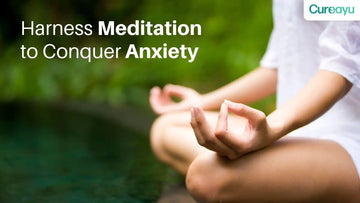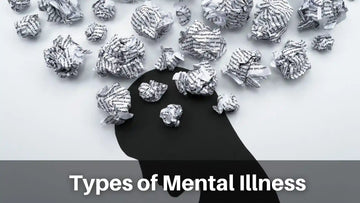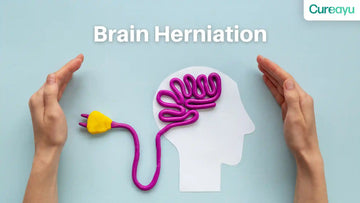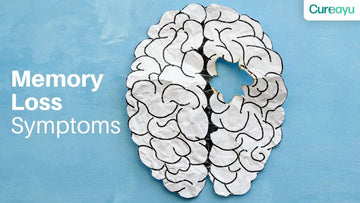In today's fast-paced world, anxiety has become a common challenge that many people face daily. Whether it's the pressures of work, personal relationships, or societal expectations, the constant stress can lead to overwhelming feelings of unease, worry, and fear. These symptoms can affect our mental well-being and take a toll on our physical health, leaving us drained and unable to enjoy life fully.
Amidst this chaos, meditation has emerged as a powerful tool to combat anxiety. Practicing meditation offers a natural and effective way to calm the mind, reduce stress, and restore emotional balance. This blog explores how meditation can be a transformative practice for those struggling with anxiety, offering them a path toward inner peace and resilience.
Also Read: A Complete Overview of Brain Strokes: Causes, Types, Symptoms, and Preventive Measures
What Is Anxiety?
Anxiety is a natural response to stress and perceived threats. It is a feeling of fear or apprehension about what might happen, often accompanied by physical symptoms such as increased heart rate, sweating, and difficulty breathing. While occasional anxiety is a normal part of life, persistent and excessive anxiety can interfere with daily activities and overall well-being.
Anxiety disorders are among the most common mental health conditions, affecting millions worldwide. These disorders can manifest in various forms, such as generalized anxiety disorder (GAD), social anxiety disorder, panic disorder, and phobias. Each type of anxiety disorder has unique symptoms, but they all share the common thread of persistent and overwhelming worry or fear.
Causes of Anxiety
1. Genetic Factors
Genetics play a significant role in the development of anxiety disorders. Individuals with a family history of anxiety are more likely to experience similar issues. Specific genes related to brain function and stress response may increase the risk of anxiety.
2. Environmental Factors
Exposure to stressful environments, such as childhood trauma, abuse, or chronic stress at work, can trigger anxiety. Negative experiences and constant exposure to stressors can create a heightened state of alertness, leading to anxiety disorders.
3. Brain Chemistry
An imbalance in neurotransmitters, such as serotonin and dopamine, can contribute to anxiety. These chemicals regulate mood and emotions, and their imbalance can lead to heightened anxiety and other mood disorders.
4. Medical Conditions
Certain medical conditions, such as heart disease, diabetes, and thyroid problems, can cause or exacerbate anxiety. The physical symptoms of these conditions may mimic or trigger anxiety, creating a cycle of fear and discomfort.
5. Substance Abuse
The use of alcohol, drugs, or even certain medications can lead to anxiety. Substance abuse can alter brain chemistry, making it more challenging to manage stress and emotions, ultimately leading to increased anxiety.
Also Read: Understanding Cervical Symptoms: Causes, Treatment, and Relief
Meditation and Anxiety
Meditation is an ancient practice that involves focusing the mind and eliminating distractions to achieve a state of calm and clarity. It has been practiced for thousands of years in various cultures and spiritual traditions as a means to connect with the inner self and the universe.
For those struggling with anxiety, meditation offers a way to break the cycle of worry and fear. By practicing meditation, individuals can train their minds to stay present, recognize anxious thoughts without judgment, and let them pass without becoming overwhelmed. This practice helps to reduce the physical and mental symptoms of anxiety, promoting a sense of peace and emotional balance.
Meditation also encourages mindfulness, which is the practice of being fully present in the moment. By focusing on the present, individuals can shift their attention away from anxious thoughts about the future or past, reducing the intensity and frequency of anxiety episodes. Over time, regular meditation can rewire the brain, making it more resilient to stress and less prone to anxiety.
Can Meditation Cure Anxiety?
While meditation cannot cure anxiety, it is a powerful tool that can significantly reduce its symptoms and improve overall well-being. Unlike medication, which often treats the symptoms of anxiety, meditation addresses the root cause by changing how the mind responds to stress.
1. Emotional Regulation
Meditation helps in regulating emotions by calming the mind and reducing the reactivity to stressors. This allows individuals to respond to challenging situations more calmly and with greater clarity.
2. Physical Relaxation
Through deep breathing and relaxation techniques, meditation can lower heart rate, reduce muscle tension, and decrease the production of stress hormones like cortisol. This physical relaxation helps alleviate the physical symptoms of anxiety.
3. Enhanced Self-Awareness
Meditation fosters self-awareness by encouraging individuals to observe their thoughts and feelings without judgment. This awareness helps in recognizing anxiety triggers and understanding patterns of thinking that contribute to anxiety.
4. Improved Focus and Concentration
Regular meditation practice enhances focus and concentration, making it easier to stay present and avoid getting caught up in anxious thoughts about the future.
Also Read: 15 Best Brain Boosting Foods to Enhance Cognitive Function and Memory
How To Meditate For Anxiety
Find a Quiet Space: Choose a quiet, comfortable place where you won’t be disturbed. Sit or lie down in a relaxed position.
Focus on Your Breathing: Close your eyes and take slow, deep breaths. Focus on the sensation of the air entering and leaving your body. This helps to anchor your mind in the present moment.
Acknowledge Your Thoughts: As you meditate, anxious thoughts may arise. Acknowledge them without judgment and gently guide your focus back to your breathing.
Practice Mindfulness: Bring your attention to the present moment. Notice the sensations in your body, the sounds around you, and the rhythm of your breath. This helps to keep your mind from wandering.
Use Guided Meditation: If you're new to meditation, consider using a guided meditation app or video. These resources can provide structure and guidance, making it easier to stay focused.
Start Small: Begin with just a few minutes of meditation each day, gradually increasing the time as you become more comfortable with the practice.
Be Consistent: Consistency is key to reaping the benefits of meditation. Try to meditate at the same time each day to build a habit.
Conclusion
Anxiety can be a challenging condition to manage, but meditation offers a natural and effective way to find relief. By incorporating meditation into your daily routine, you can reduce the symptoms of anxiety, improve your emotional well-being, and enhance your overall quality of life. While meditation may not cure anxiety entirely, it is a valuable tool that empowers individuals to take control of their mental health and cultivate a more peaceful and balanced mind. Whether you are new to meditation or have been practicing for years, the benefits of meditation for anxiety are profound and lasting, offering a path toward a calmer and more centered life.












